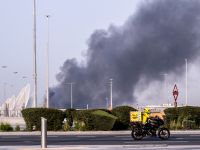Hotels across the Middle East and North Africa (MENA) are reporting a bounce-back in occupancy following a slow Ramadan according to a recent report conducted by MKG Hospitality.
“Most markets either return to positive growth or at least slow down the decline, as tourism kicks back into gear following the slow period during Ramadan,” said Vanguelis Panayotis, director of development at MKG Hospitality. “The peak of summer ends, which means business segments and MICE return to normal, whilst leisure tourism — intra-regional and international — favour this period.”
According to the survey, the UAE experienced an increase of almost 10 points in occupancy rates, reaching 73 per cent with Dubai being the country’s best performer.
Results from the recent MENA Chain Hotels Market Review by TRI Hospitality Consulting which studied hotels in Dubai, Abu Dhabi, Sharm Al Shaikh, Cairo, Riyadh and Jeddah, show that Dubai had the highest hotel occupancy at 80.4 per cent in the first nine months of 2011. Abu Dhabi’s occupancy topped 67.2 per cent.
Tourist influx
During the Eid holidays, UAE hotels anticipated 100 per cent occupancy due to an influx of tourists from neighbouring GCC countries. Oman also saw an increase in average hotel occupancy rates — boosted by 15 percentage points. This follows an increase in conferences and the easing of Omani entry visas for 60 countries, where it is now obtainable on arrival, according to MKG Hospitality. Qatar’s occupancy rates grew by six points and Algeria’s grew by two points in September.
According to the MENA Chain Hotels Market Review, Riyadh had the highest average room rate (ARR) at $260.30 (Dh956) while Sharm Al Shaikh, Egypt had the lowest at $48.10.
Security fears
“Hotel performance levels in Cairo are not likely to improve until the protests subside, the security situation improves and international travellers put Egypt back on their travel itinerary,” Peter Goddard, managing director of TRI Hospitality Consulting Middle East, told Gulf News. “In the short term, performance is likely to remain subdued under the threat of possible violence associated with the proposed general election planned in November and presidential election planned in early 2012.”
According to Panayotis it will take some time before year-to-date results throughout the region are well and truly in positive mode.








